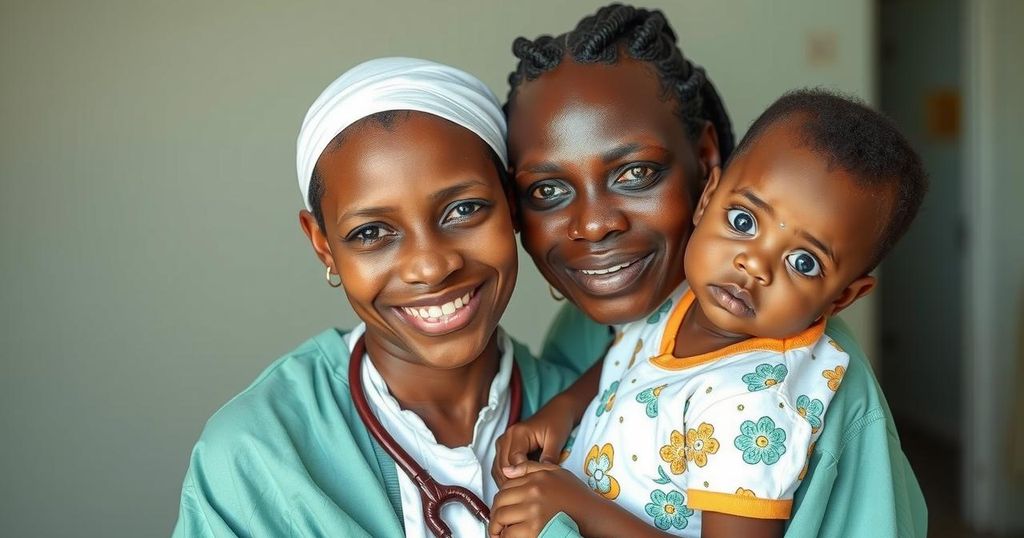Lifestyle
AFRICA, DEVELOPMENT, ECONOMIC GROWTH, FINANCING FACILITY, FOOD SECURITY, GENDER, GFF, HAJI, HAJIYA, HAJIYA A ' ISHATU, HEALTH, INTERNALLY DISPLACED PERSONS (IDPS, KADUNA, KADUNA STATE, NIGERIA, NIGERIA STATE HEALTH INVESTMENT PROJECT, NORTHEASTERN REGION, TUDUN - WADA, TUDUN WADA PRIMARY HEALTH CARE FACILITY, WORLD BANK
Sofia Rodriguez
0 Comments
Partnering for Progress: Improving Maternal and Child Health in Nigeria
Hajiya A’ishatu’s experience in Nigeria highlights the improvements in maternal and child health services aimed at reducing high mortality rates. Supported by the GFF and World Bank, significant advancements have been made, including increased access to safe deliveries and adolescent health services. Despite these benefits, challenges such as funding shortages and accessibility persist, prompting further initiatives like the Nigeria Health Sector Renewal Investment Initiative to enhance healthcare across the country.
Hajiya A’ishatu resides in the outskirts of Tudun-Wada, Gombe State, Nigeria, where she owns a shop selling beverages and assorted merchandise. Her positive experience at the Tudun Wada Primary Health Care Facility during her children’s births underscores the significance of maternal and child health services in Nigeria, where maternal and child mortality rates are alarmingly high. The government of Nigeria has prioritized improvements in these services, especially in marginalized communities, by establishing the Basic Health Care Provision Fund. This initiative, supported by the Global Financing Facility (GFF) and the World Bank, has strengthened approximately 900 health facilities with necessary resources, providing free maternal services and encouraging safe deliveries.
From 2014 to 2020, significant improvements were recorded, with safe deliveries increasing from 22% to 68%, and immunizations for children reaching 1 million annually. The acceleration of adolescent health services, especially in Kaduna State, has allowed young women access vital information and resources regarding family planning, enhancing their ability to make informed choices. Health workers play a crucial role in educating communities and addressing malnutrition among pregnant women and young children, serving nearly 5 million mothers and over 7 million children under five.
Despite these advancements, considerable challenges persist. Funding for maternal and child health remains inadequate, leading to preventable deaths in women and children, particularly in rural areas lacking robust health services. Staff shortages and rising costs deter many from utilizing health care, pushing some to seek traditional remedies or home births. Recent economic downturns have exacerbated these issues, threatening the gains achieved thus far.
To address these challenges, Nigeria has launched the Nigeria Health Sector Renewal Investment Initiative, which aims to reduce maternal and child mortality through a collaborative sector-wide approach. The recent approval of a $570 million primary health care project, comprising $500 million from the World Bank and additional support from various partners, aims to alleviate financing shortages and enhance healthcare delivery to the most vulnerable populations. With renewed commitment to strategic investments and partnerships, Nigeria aims to transform its healthcare sector and improve the lives of women, children, and adolescents across the country.
The article discusses Nigeria’s ongoing efforts to tackle high rates of maternal and child mortality, which significantly impact the nation’s population—particularly in underserved communities. It highlights the establishment of programs aimed at enhancing maternal health services, supported by international partnerships and funding. The work of local health facilities and initiatives geared toward adolescent health are emphasized, along with challenges related to funding and accessibility of services in the face of economic hardship. The narrative underscores a collective strategy to improve health outcomes for women and children in Nigeria.
Nigeria’s commitment to addressing the alarming rates of maternal and child mortality is reflected through strategic investments and partnerships aimed at enhancing health services, particularly for marginalized populations. While notable progress has been made, ongoing challenges, including underfunding and accessibility issues, require continued attention and collaborative efforts. The Nigeria Health Sector Renewal Investment Initiative embodies a forward-thinking approach toward ensuring healthier futures for women, children, and adolescents, potentially reducing preventable deaths and promoting overall well-being.
Original Source: www.worldbank.org




Post Comment